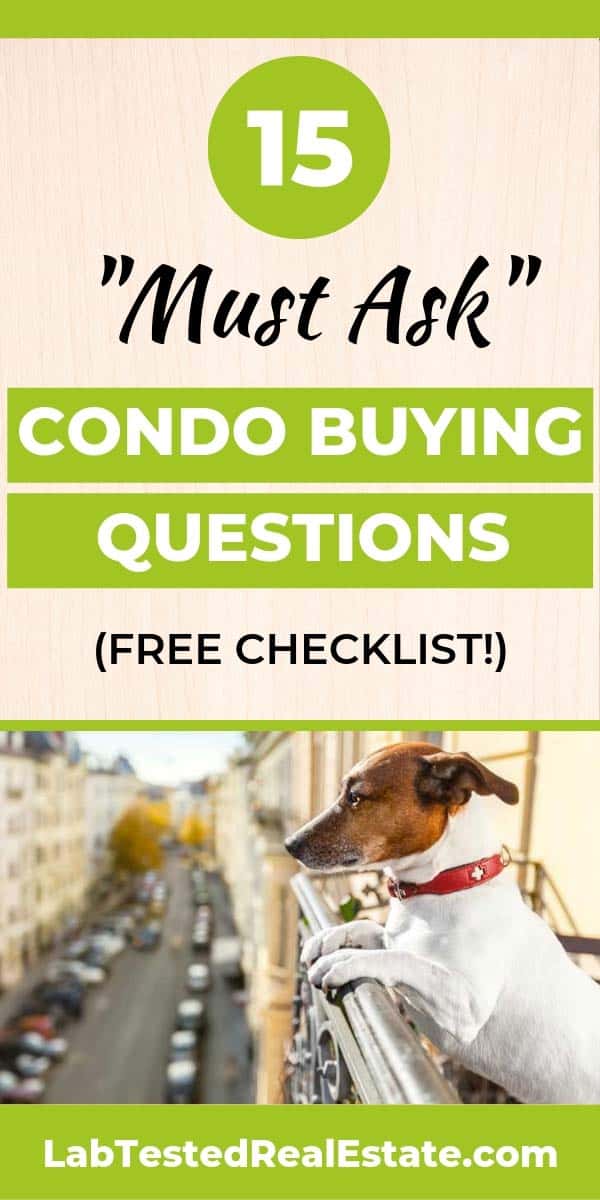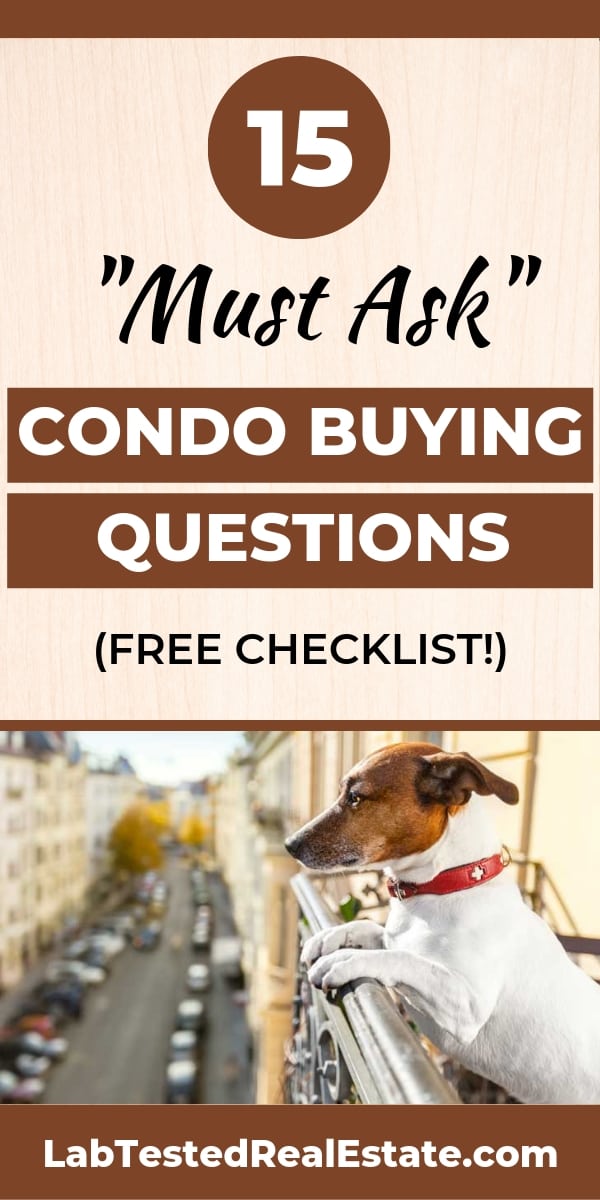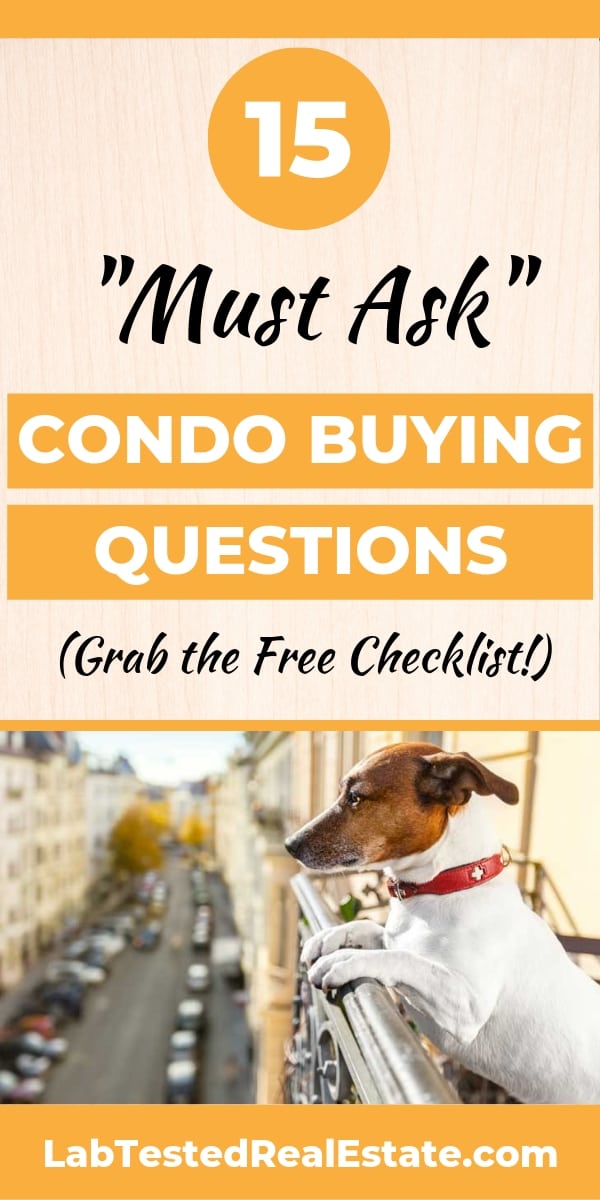Do you have condo buying real estate clients?
When you do, make sure they know the right questions to ask… before things are finalized!
It can save your buyers many thousands of dollars… plus mean the difference between happy clients who are excited to refer you versus ones who are not.
Here’s a list of 15 “Must Ask” Condo Buying Questions (and a free downloadable Condo Buying Checklist) you can use to help your clients make choices they’ll be happy with long term.

More...
[Click the audio player to listen to the audio version on the Lab Tested Real Estate Podcast.]
15 "Must Ask" Condo Buying Questions
1. What's the condo complex owner occupancy rate?
How many of the units are occupied by owners rather than renters? At least 50% is a decent number to use as a base point, seeing as this is the lower cutoff point for some financing options.
Some buyers and lenders prefer to see 70% or higher. The general perception is that owners are more personally invested and likely to take better care of their properties than renters.
2. Are there any pending condo litigation issues?
It's all too common for recently built condo complexes to sue the builder or a contractor involved in the construction. In the soggy Pacific Northwest many complexes have at some point been involved in litigation regarding faulty installation of window flashings that allowed water intrusion, or have had to have their EIFS 'stucco' siding replaced.
Tip: If a legal issue seems extremely likely to be resolved in a satisfactory manner soon, this can be a good opportunity for your buyer to get a unit that still has an unofficial price discount because of the litigation damaging its market appeal. (Especially true if your client is a cash buyer who doesn't have to worry about a lender nixing the deal due to the lawsuit.)
When condo buying, keep in mind that there's always a risk the litigation will NOT be resolved. Nothing is a done deal until it is, and your client needs to be completely aware of that.
3. Is the complex professionally managed?
Many large condo complexes hire an independent management company to run their affairs, whereas some smaller complexes are self-managed by homeowners. Either option can work well (or not).
Regardless, this is something your condo buying clients should be aware of so they have a chance to evaluate how it may affect them.
4. Is there an active HOA (Homeowner Association)?
Even when the complex is professionally managed, there is usually an association of homeowners who meet regularly to discuss issues regarding the complex. See if you can help your clients obtain minutes of recent homeowner meetings - these usually give you a window into what's happening in the community, and may give you a heads up about any upcoming special assessments.
5. Are there sufficient financial reserves?
When buying a condo, buyers usually have a chance to review the Resale Certificate for the complex. (In Washington this is a state requirement that they don't even have the option to waive.)
The Resale Certificate will show the financial condition of the complex, including the dollar amount of homeowner dues currently in default, and the amount held in Reserves for major expenditures.
For example, if the complex needs to replace the roofs or repave the common asphalt areas, it's good to know whether there's enough money in Reserves to cover it, or if the complex would have to levy a Special Assessment.
6. Are there any upcoming Special Assessments?
When the complex is faced with a large expense it can't cover with the Reserves, it may levy a Special Assessment against each unit in order to come up with the funds.
Special Assessments are usually based on your unit's percentage of square footage, so larger units will pay more. Sometimes Special Assessments can be paid off over months or years, but occasionally complexes will require them to be paid in one lump sum. The amounts vary from hundreds to tens of thousands of dollars.
(I know, ouch!)
If a Special Assessment has already been levied against the unit, it should be disclosed in the listing, and the agent remarks may state up front how the seller will handle it (i.e., "Seller to pay off Special Assessment at closing.")
Three main things to consider are:
1) Is there a Special Assessment in the works that has not yet been assessed?
2) If there's already an assessment, who's going to pay for it - seller or buyer?
3) If there's a current or upcoming Special Assessment, is the cause understandable or is there some systemic problem with management that is creating financial issues?
7. Is the complex approved by the FHA?
This is usually by no means a deal killer, unless of course your buyers are using an FHA loan. The Federal Housing Administration keeps a list of "approved" condo complexes based on the results of Reserve Studies paid for by the complexes.
Here's where you can check to see if a condo complex is approved by the FHA or VA:
https://fhareview.com/check-status-fha-va-condo-approval/
Two things to keep in mind:
1) Many healthy condo complexes are not approved by the FHA simply because they've never paid for a Reserve Study or applied for approval. This is especially true of smaller and/or self-managed complexes.
2) Regardless of how healthy the complex is, it's a fact that when your buyers are ready to sell their unit, the target market will be somewhat larger if the complex is FHA-approved.
Here's a rundown of 2019 FHA Condo Guidelines.
8. Are the homeowner dues reasonable?
Think Goldilocks: "Not too high, and not too low" is the goal here. When dues are too low the complex doesn't have enough money to keep Reserves healthy, whereas very high dues can turn away buyers and decrease property value.
Whether or not dues are "high" depends in part on what is included. Does the complex have elevators, exercise facilities, a pool, a rooftop deck, a movie room, or conference areas? Do the dues include expenses such as cable, hot water, garbage, or sewer?
A VERY general guideline in the greater Seattle area is for dues to be approximately .1 percent of a unit's market value. For example, if a unit would reasonably sell for around $360,000, it may be reasonable to expect the dues to be somewhere in the $360 per month range. (If you're using this as a data point, just multiply the price of the unit by .001.)
That is an extremely general estimation, and varies widely depending on what amenities come with the unit. (Dues in other parts of the U.S. may be quite different.)
9. Is there a rental restriction?
Some complexes restrict the number of units that can be used as rentals. In the Seattle area a common restriction is for no fewer than 80% of the units to be owner-occupied, although it can vary.
Pros: This prevents a complex from being targeted by investors and turning into what feels like a community of apartment rentals. The general perception is that owners are more likely to take good care of their properties.
Cons: It limits your clients' options. If they end up moving and would prefer to rent out their unit rather than sell it, they may not be able to. It also means that when they do sell, their target market is somewhat reduced because it will probably not include investors.
10. Are there pet restrictions?
Many complexes won't accept dogs over a certain weight, or they may not accept dogs or cats at all. This is something to find out even if your clients don't have pets, because it may affect their resale market down the road.
11. Is there a washer and dryer inside the unit?
For many people, condo buying is their first step out of apartment life into homeownership. If that's the case, your buyers may be secretly longing to finally be done with shlepping their laundry around common laundry facilities. (Completely understandable!)
Every amenity is relative to price, of course, but it's worth noting that the washer/dryer question can really hit an emotional hot button with buyers - and this in turn affects your client's eventual resale value.
12. Does one entity own more than 10% of the units?
This is one of things that sneaks up on you during the lender review, and can cause problems if the answer is "Yes".
I recently read that this condition does not apply to complexes of 5 to 20 units, but I remember I ran into this problem several years ago when I helped a client purchase a condo in a 16-unit complex where one person already owned two units.
Fortunately the lender was able to get around it, and it appears from what I read that guidelines may have changed since that time, but it's still something to keep an eye out for so you can run it past the lender.
13. If the unit comes with parking, how is the parking space assigned to the unit?
When the condo unit comes with parking, such as a carport or a specific garage space, this is usually assigned to the unit on the Condo Declaration and it's easy to look it up when you get a copy of the Resale Certificate and associated documents.
If that's the case, it's on record that the parking space was assigned to the unit when the complex was first formed.
Occasionally, however, the parking spot is a separate piece of property with its own legal description and Tax ID number. (This often happens if a condo owner bought the parking space from someone else in the complex after they purchased their unit.)
Whatever the reason, in these cases the parking space probably needs to be treated like a separate piece of property and specifically included in the Purchase and Sale agreement with its legal description or at least the parcel number. (Check with escrow to find out what's necessary.)
If not, you could find out after closing that your client bought the condo unit, but not the parking space they thought went along with it.
Tip: The owner and listing agent may not even be aware of this, so it's important to verify the parking space situation every time you handle a condo purchase.
14. Are your clients OK with the CCRs?
The Covenants, Codes and Restrictions determine what your clients can and can't do with their unit. They are typically recorded on title and available from the title company, or they may be part of the Resale Certificate packet.
Tip: You'll want to know for sure that the contract allows for a review of the CCRs - never just assume that it's part of the agreement.
Just a few examples of what CCRs may do:
15. Are there known restrictions on remodeling?
Some complexes limit whether or not owners can install hardwood floors in units that are located above another unit, due to the potential noise. (This is definitely something to check on if your client walks into a unit and says "I can't wait to rip out this carpet and get hardwoods in here!")
Key Takeaways


